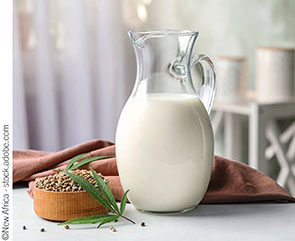Always one of the first to latch onto a new trend, Ben & Jerry’s announced last May that it planned to offer a cannabis-infused ice cream. The caveat? The ice cream maker has to wait until it’s legal to do so. “We’re still in a holding pattern, as the FDA is the deciding body to confirm if and when food manufacturers can use CBD,” says Ben & Jerry’s spokesman Sean Greenwood.
“CBD” refers to cannabidiol, a non-intoxicating chemical obtained from hemp that some believe has medicinal benefits such as pain relief and stress reduction. U.S. sales of CBD-based drinks are expected to grow dramatically, to more than $1.4 billion in 2023, up from $86 million in 2019, according to researcher Zenith Global’s Beverage Digest.
“Key growth drivers for CBD drinks include loosening regulatory implementation, investment by major brewers, and innovation by numerous startups,” Zenith Global Chairman Richard Hall said when the report was released last year.
Speaking at the International Dairy Foods Association’s annual conference in Arizona in January 2020, group president and CEO Michael Dykes, DVM, said there is an “absolute insatiable [consumer] appetite” for more CBD products. That will spur dairy industry companies to consider offering products, he added.
“Industry is moving and saying, ‘Look, we’re going to be careful with the claims we make, and yes, we’re going to take some risk,’” industry website Food Dive quoted him as saying. “They are going to find a way [to make CBD products]. There is such a tremendous consumer demand for it, there is such a market for it, that they are going to find some way to tap into that market rather than wait for the [FDA to catch up].”
Other nations, including the U.K., allow hemp stems and seeds for industrial use. Milk-alternative company Good Hemp, for example, is selling a CBD beverage called Barista Seed Milk for use in coffee.
No Approval from FDA
Hemp and marijuana are in the same cannabis plant family, Cannabis sativa. The difference between them lies in the amount of the psychoactive ingredient tetrahydrocannabinol (THC) that they can contain. USDA rules specify that hemp has 0.3 percent or less of THC on a dry-weight basis, while marijuana can contain more.
 While hemp is legal, FDA has not approved the sale of CBD-infused foods and beverages, citing safety concerns. Those include potential liver injury, drug interactions, male reproductive toxicity, and side effects such as drowsiness, according to an FDA advisory. Despite the FDA’s disapproval, CBD-infused oils, coffees, cookies, and other products already are being sold in the United States, thanks in part to the Agriculture Improvement Act of 2018, also known as the farm bill. That act removed hemp from the definition of marijuana in the Controlled Substances Act.
While hemp is legal, FDA has not approved the sale of CBD-infused foods and beverages, citing safety concerns. Those include potential liver injury, drug interactions, male reproductive toxicity, and side effects such as drowsiness, according to an FDA advisory. Despite the FDA’s disapproval, CBD-infused oils, coffees, cookies, and other products already are being sold in the United States, thanks in part to the Agriculture Improvement Act of 2018, also known as the farm bill. That act removed hemp from the definition of marijuana in the Controlled Substances Act.
While some large companies have hesitated to sell CBD-infused foods or beverages under their established brands thus far, small entrepreneurial companies are taking the leap into the market. Dr. Dykes said larger dairy companies might dip their feet into the CBD market by introducing new brands, by licensing products from another company, or via a joint venture.
In the nascent industry, companies are reluctant to speak publicly about the business potential of CBD-infused foods or beverages. When selling their products, however, some companies have been brazen about health claims in the face of FDA concerns about the safety of CBD. Last November, FDA issued warnings to 15 companies for illegal sales of products—not all of them selling infused food or beverages—containing CBD.
Said FDA Principal Deputy Commissioner Amy Abernethy, MD, PhD, “We remain concerned that some people wrongly think that the myriad of CBD products on the market, many of which are illegal, have been evaluated by the FDA and determined to be safe, or that trying CBD ‘can’t hurt.’”
First to Market
Still, some experts think the enforcement has been lax, allowing the companies to operate. Martin Hahn, a lawyer and partner with Hogan Lovells in Washington, D.C., said the risk may be worth it to companies so that they can get to market first. “All segments of the food industry are monitoring CBD closely, looking for opportunity,” Hahn says. “Still, regulatory hurdles and the FDA’s position are making many food companies reluctant to jump in.”
ACCESS THE FULL VERSION OF THIS ARTICLE
To view this article and gain unlimited access to premium content on the FQ&S website, register for your FREE account. Build your profile and create a personalized experience today! Sign up is easy!
GET STARTED
Already have an account? LOGIN

